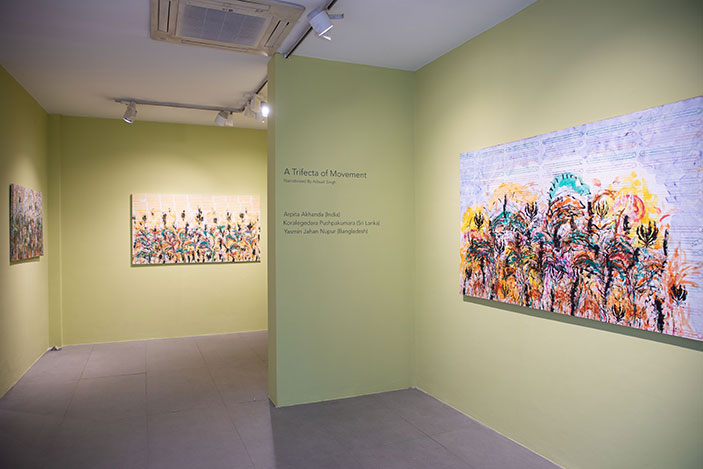A TRIFECTA OF MOVEMENT
This exhibition brings together works of three artists occupying similar post-colonial contexts in South Asia :
Yasmin Jahan Nupur from Bangladesh, Koralegedara Pushpakumara from Sri Lanka, and Arpita Akhanda from India. Their works become occasions for unspooling three individual yarns from the globalised tapestry of commerce, informational exchange, and human migrations. The three movements whose arcs the exhibition narrativizes are: the movement of material (goods and bodies), the movement of (colonial) mischief, and the movement of (public and personal) memory. Each of these movements can be traced, to varying extent and with fluctuating urgency, in the works of all three artists such that it often feels that a thread dropped by one here is seamlessly picked up elsewhere by another. Like multiple ripples running through the surface of a pond, these movements clash and coalesce, accentuating and attenuating their affect by turns.
The first movement traces the intricate entanglements of a particularly fine variety of cotton from Dhaka with the Mughal royalty, 18th and 19th century European fashions, the industrial revolution in Britain, the plantocracies of Africa and the Caribbean, migrations of indentured labour, and the ongoing capitalist exploitation. Employing Jamdani - the only surviving form of the world-renowned mulmul (muslin) from Dhaka - as her medium of choice for these works, Yasmin Jahan Nupur relates a tale of shifting fortunes, loss, displacement and exploitation. During a residency in Mauritius in 2011, the artist had the opportunity to interview a number of Bangladeshi immigrants - most of them engaged in textile manufacturing - and was amazed to discover how little has changed in their working conditions since the first Indian indentured labourers set foot on Mauritian soils, around the same time as the official abolition of slavery by Britain in 1833. The labourers then were contracted for a period of 5 years for a monthly pittance of 8 rupees (equivalent to $4 in 1826) and sometimes had to contribute to their own passage back home. The Bangladeshi immigrants working in Mauritius currently are similarly hired for a 5 years term. Not only is their labour poorly rewarded, but their passports are retained by their employers and they live under abysmal conditions, sometimes 6 to a room.

